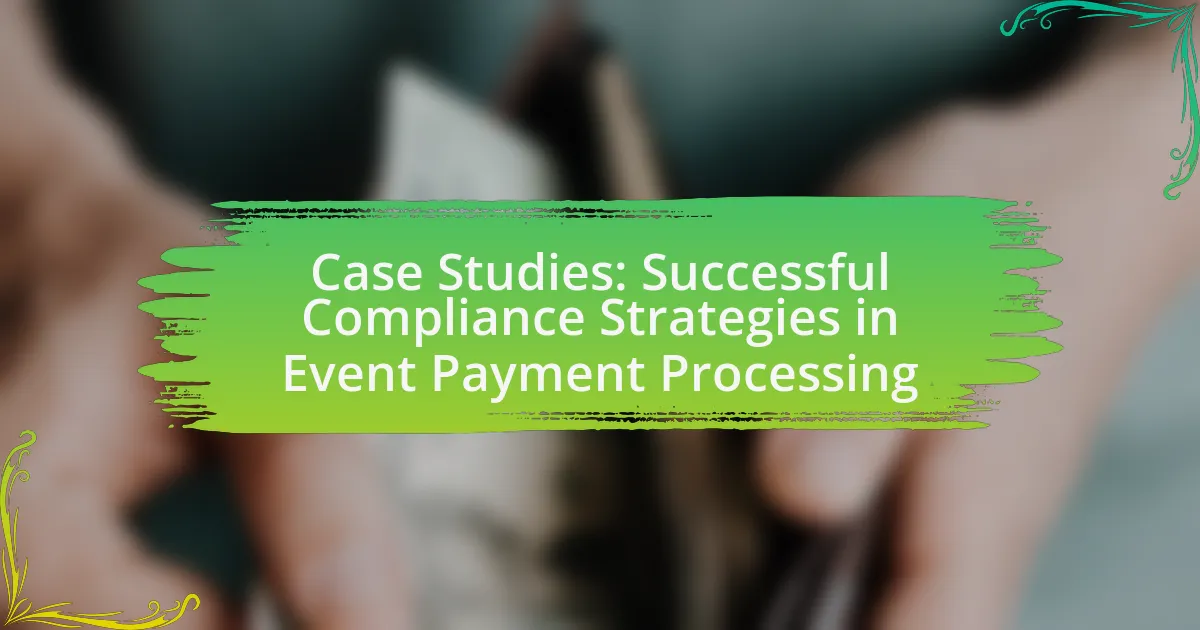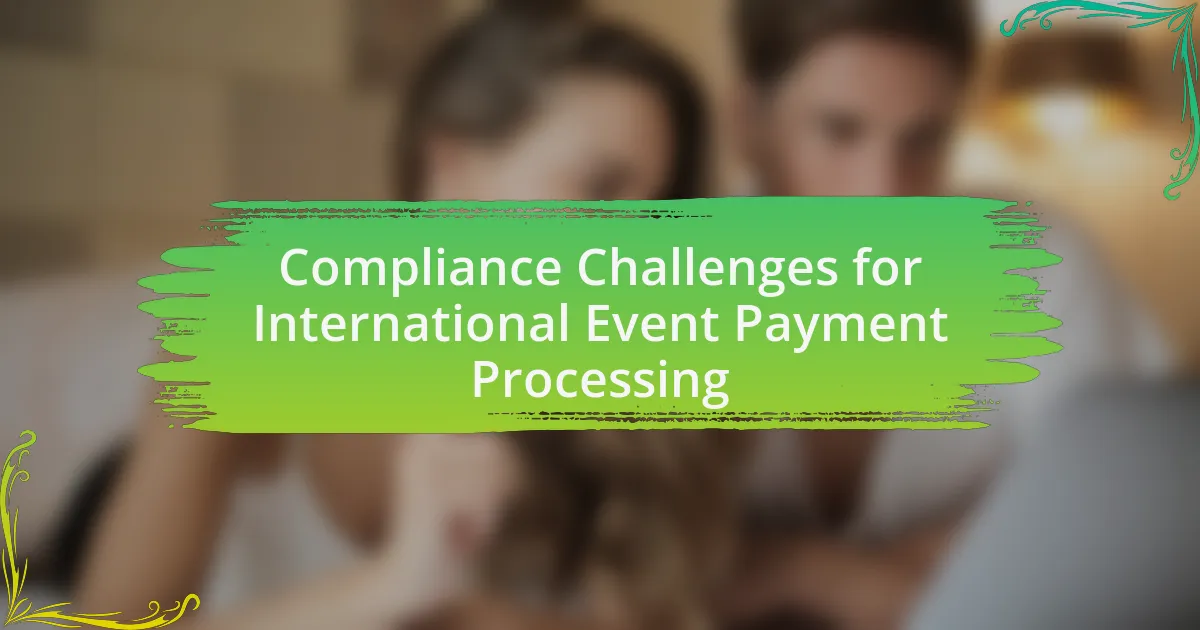Chargebacks in event payments refer to the reversal of transactions initiated by cardholders, often due to disputes over unauthorized charges or dissatisfaction with services. This article explores the causes and implications of chargebacks for event organizers, highlighting common reasons such as unauthorized transactions, service failures, and customer dissatisfaction. It emphasizes the importance of effective chargeback management strategies, including proactive measures like clear communication and accurate event descriptions, as well as responsive tactics for disputing chargebacks. Additionally, the article discusses the financial impacts of chargebacks on event organizers and outlines tools and best practices for minimizing their occurrence and improving overall customer satisfaction.
What are Chargebacks in Event Payments?

Chargebacks in event payments are transactions that are reversed by the payment processor at the request of the cardholder, typically due to disputes over unauthorized charges or dissatisfaction with the service. This process allows consumers to reclaim funds when they believe a transaction was fraudulent or when the event did not meet their expectations. According to the Federal Trade Commission, chargebacks can significantly impact businesses, leading to financial losses and potential penalties from payment processors if the chargeback rate exceeds a certain threshold.
How do chargebacks occur in the context of event payments?
Chargebacks in the context of event payments occur when a customer disputes a transaction, leading to a reversal of the payment. This typically happens due to reasons such as unauthorized transactions, dissatisfaction with the event, or failure to receive tickets. According to a report by the National Retail Federation, chargebacks can cost businesses up to 3% of their revenue, highlighting the financial impact on event organizers. Additionally, the payment processor investigates the dispute, which can result in the event organizer losing both the funds and the merchandise or service provided.
What are the common reasons for chargebacks in event payments?
Common reasons for chargebacks in event payments include unauthorized transactions, dissatisfaction with the event, and failure to deliver services as promised. Unauthorized transactions occur when a cardholder claims they did not authorize the payment, often due to fraud or identity theft. Dissatisfaction arises when attendees feel the event did not meet their expectations, such as poor organization or lack of promised features. Additionally, failure to deliver services can lead to chargebacks if the event is canceled or significantly altered without proper notification. According to a study by the Chargeback Gurus, 40% of chargebacks are attributed to customer dissatisfaction, highlighting the importance of clear communication and service delivery in reducing chargeback rates.
How do consumer behaviors influence chargebacks?
Consumer behaviors significantly influence chargebacks by determining the likelihood of disputes over transactions. When consumers feel dissatisfied with a purchase, whether due to unmet expectations, product quality issues, or service failures, they are more inclined to initiate a chargeback. Research indicates that approximately 60% of chargebacks stem from consumer disputes related to perceived fraud or dissatisfaction with the product or service received. Additionally, impulsive buying behaviors can lead to buyer’s remorse, prompting consumers to seek refunds through chargebacks rather than traditional return processes. This trend highlights the importance of understanding consumer motivations and experiences to mitigate chargebacks effectively.
Why is it important to manage chargebacks effectively?
Effectively managing chargebacks is crucial because it directly impacts a business’s financial health and reputation. High chargeback rates can lead to increased processing fees, potential loss of merchant accounts, and damage to customer trust. According to a study by the Merchant Risk Council, businesses with chargeback rates exceeding 1% may face penalties from payment processors, which can escalate operational costs and hinder growth. Additionally, effective chargeback management helps identify fraudulent transactions and improve customer service, ultimately fostering a more secure and trustworthy payment environment.
What financial impacts do chargebacks have on event organizers?
Chargebacks significantly impact event organizers by reducing their revenue and increasing operational costs. When a chargeback occurs, the event organizer not only loses the sale amount but may also incur additional fees from payment processors, which can range from $15 to $100 per chargeback. Furthermore, a high chargeback rate can lead to penalties from payment processors, including higher transaction fees or even the termination of merchant accounts. According to a study by the Merchant Risk Council, businesses with chargeback rates exceeding 1% face increased scrutiny and potential financial repercussions. Thus, the financial implications of chargebacks can be substantial, affecting both immediate cash flow and long-term business viability for event organizers.
How can chargebacks affect the reputation of an event?
Chargebacks can significantly damage the reputation of an event by signaling to potential attendees that there may be issues with the event’s legitimacy or quality. When a high number of chargebacks occur, it suggests dissatisfaction among customers, which can lead to negative reviews and decreased trust in the event organizers. Research indicates that events with a high chargeback ratio may be perceived as unreliable, resulting in lower ticket sales and reduced future attendance. Additionally, payment processors may impose stricter terms or higher fees on event organizers with frequent chargebacks, further impacting their financial stability and reputation in the industry.
What Strategies Can Be Implemented to Manage Chargebacks?

To manage chargebacks effectively, businesses should implement a combination of proactive measures and responsive strategies. Proactive measures include enhancing transaction security through advanced fraud detection tools, ensuring clear communication with customers regarding payment terms, and providing detailed receipts to minimize misunderstandings. Responsive strategies involve promptly addressing customer complaints, maintaining thorough documentation of transactions, and establishing a clear dispute resolution process. According to a study by the Merchant Risk Council, businesses that adopt these strategies can reduce chargeback rates by up to 30%, demonstrating the effectiveness of a comprehensive approach to chargeback management.
How can event organizers prevent chargebacks before they happen?
Event organizers can prevent chargebacks before they happen by implementing clear communication and transparent refund policies. Establishing detailed event descriptions, providing timely updates, and ensuring that attendees understand the terms of purchase can significantly reduce misunderstandings that lead to chargebacks. According to a study by the Merchant Risk Council, 86% of chargebacks occur due to customer confusion or dissatisfaction with the purchase process. By proactively addressing these areas, event organizers can minimize the likelihood of disputes and enhance customer satisfaction.
What role does clear communication play in chargeback prevention?
Clear communication plays a crucial role in chargeback prevention by ensuring that customers fully understand the terms of their transactions and the services provided. When businesses clearly articulate policies, pricing, and expectations, they reduce the likelihood of misunderstandings that can lead to disputes. For instance, a study by the Federal Reserve indicates that clear transaction descriptions can decrease chargeback rates by up to 30%, as customers are less likely to dispute charges they recognize and understand. Thus, effective communication directly correlates with lower chargeback occurrences, reinforcing the importance of transparency in customer interactions.
How can accurate event descriptions reduce chargebacks?
Accurate event descriptions can significantly reduce chargebacks by providing clear and detailed information about the event, which helps set proper expectations for attendees. When customers have a precise understanding of what to expect, they are less likely to feel misled or dissatisfied, which are common reasons for initiating chargebacks. For instance, a study by the Chargeback Gurus found that 70% of chargebacks stem from customer confusion regarding the product or service received. By ensuring that event descriptions include specifics such as date, time, location, and features of the event, organizers can minimize misunderstandings and enhance customer satisfaction, ultimately leading to fewer chargebacks.
What are effective response strategies after a chargeback occurs?
Effective response strategies after a chargeback occurs include promptly reviewing the chargeback details, gathering relevant documentation, and responding to the chargeback dispute with a well-structured rebuttal. Reviewing the chargeback details allows businesses to understand the reason behind the chargeback, which is crucial for addressing the issue effectively. Gathering documentation such as transaction records, customer communications, and proof of service delivery strengthens the case when disputing the chargeback. A well-structured rebuttal should clearly address the chargeback reason, present the gathered evidence, and comply with the payment processor’s guidelines. According to a study by the Chargeback Gurus, businesses that respond to chargebacks with comprehensive evidence have a higher success rate in disputing them, demonstrating the importance of these strategies.
How can event organizers gather evidence to dispute chargebacks?
Event organizers can gather evidence to dispute chargebacks by collecting comprehensive documentation related to the transaction. This includes retaining copies of tickets, registration confirmations, and communication with attendees, such as emails or messages that confirm attendance or agreement to terms. Additionally, organizers should document the event details, including the date, location, and any promotional materials that were provided, which can demonstrate the legitimacy of the event.
Furthermore, utilizing payment processing records that show the transaction history and any relevant terms and conditions agreed upon at the time of purchase can strengthen the case. According to a study by the Chargeback Gurus, having detailed records can increase the likelihood of successfully disputing chargebacks by up to 80%. This evidence collectively supports the organizer’s position and can effectively counter claims made by the cardholder.
What steps should be taken to communicate with payment processors?
To communicate with payment processors, first, establish a clear point of contact, typically through their customer service or support channels. Next, prepare all relevant transaction details, including transaction IDs, dates, and amounts, to facilitate efficient communication. Then, articulate your concerns or inquiries clearly and concisely, ensuring that you specify the nature of the issue, such as chargebacks or disputes. Follow up if necessary, maintaining a record of all communications for reference. This structured approach enhances the likelihood of a timely and effective resolution.
What Tools and Resources Are Available for Managing Chargebacks?

Tools and resources available for managing chargebacks include chargeback management software, payment processors with chargeback protection features, and educational resources on chargeback prevention. Chargeback management software, such as Chargeback Gurus or Verifi, helps businesses track and analyze chargeback data, enabling them to identify patterns and implement preventive measures. Payment processors like PayPal and Stripe offer built-in chargeback protection services that assist merchants in disputing chargebacks effectively. Additionally, resources such as the Chargeback Guide by the Electronic Payments Association provide valuable insights into best practices for minimizing chargebacks and understanding the dispute process. These tools and resources collectively enhance a business’s ability to manage and reduce chargebacks effectively.
What software solutions can help track and manage chargebacks?
Software solutions that can help track and manage chargebacks include Chargeback Gurus, Verifi, and Chargebacks911. Chargeback Gurus offers a comprehensive platform that automates the chargeback management process, providing analytics and reporting tools to identify trends and reduce future chargebacks. Verifi specializes in real-time chargeback prevention and resolution, allowing merchants to address disputes before they escalate. Chargebacks911 provides a suite of services that includes chargeback alerts, representment, and analytics to help businesses understand and mitigate chargeback risks. These solutions are designed to streamline the chargeback process, improve response times, and ultimately reduce financial losses associated with chargebacks.
How do analytics tools assist in understanding chargeback trends?
Analytics tools assist in understanding chargeback trends by providing data-driven insights into transaction patterns and customer behavior. These tools analyze historical chargeback data, identifying key factors such as the frequency of disputes, reasons for chargebacks, and the demographics of affected customers. For instance, a study by the Chargeback Gurus found that businesses using analytics tools could reduce chargeback rates by up to 30% by pinpointing specific issues leading to disputes. This capability enables organizations to implement targeted strategies to mitigate chargebacks, such as improving customer service or refining payment processes.
What features should event organizers look for in chargeback management tools?
Event organizers should look for features such as automated dispute management, real-time transaction monitoring, and comprehensive reporting in chargeback management tools. Automated dispute management streamlines the process of responding to chargebacks, reducing the time and effort required to handle each case. Real-time transaction monitoring allows organizers to identify potentially fraudulent transactions quickly, enabling proactive measures to prevent chargebacks. Comprehensive reporting provides insights into chargeback trends and patterns, helping organizers understand the root causes and adjust their strategies accordingly. These features collectively enhance the efficiency and effectiveness of managing chargebacks in event payments.
How can training and education help in managing chargebacks?
Training and education can significantly enhance the management of chargebacks by equipping staff with the necessary skills to identify, prevent, and respond to chargeback situations effectively. Educated employees are more likely to understand the nuances of payment processing, customer service, and fraud detection, which are critical in minimizing chargeback occurrences. For instance, a study by the Merchant Risk Council found that businesses with comprehensive chargeback training programs experienced a 30% reduction in chargeback rates. This demonstrates that informed staff can implement best practices, such as clear communication with customers and thorough documentation of transactions, which are essential in disputing chargebacks successfully.
What topics should be covered in chargeback management training?
Chargeback management training should cover the following topics: understanding chargeback processes, identifying common reasons for chargebacks, implementing preventive measures, analyzing chargeback data, and developing effective dispute resolution strategies.
Understanding chargeback processes involves educating participants on how chargebacks are initiated, the roles of various stakeholders, and the timelines involved. Identifying common reasons for chargebacks includes recognizing issues such as fraud, customer dissatisfaction, and processing errors. Implementing preventive measures focuses on best practices for transaction security, clear communication with customers, and accurate billing descriptions. Analyzing chargeback data entails teaching participants how to track and interpret chargeback trends to inform business decisions. Finally, developing effective dispute resolution strategies equips participants with skills to respond to chargebacks efficiently, including gathering evidence and communicating with payment processors.
These topics are essential for minimizing financial losses and improving customer relations in event payments.
How can staff awareness reduce the likelihood of chargebacks?
Staff awareness can significantly reduce the likelihood of chargebacks by ensuring that employees are knowledgeable about payment processes and customer service best practices. When staff members understand the importance of accurate transaction processing and effective communication with customers, they are better equipped to address potential issues before they escalate into disputes. For instance, training employees to recognize signs of customer dissatisfaction can lead to proactive resolutions, thereby decreasing the chances of a chargeback. Research indicates that businesses with well-trained staff experience up to 30% fewer chargebacks, highlighting the direct correlation between staff awareness and chargeback reduction.
What are the best practices for ongoing chargeback management?
The best practices for ongoing chargeback management include implementing robust fraud detection systems, maintaining clear communication with customers, and regularly analyzing chargeback data. Fraud detection systems help identify and prevent unauthorized transactions, reducing the likelihood of chargebacks. Clear communication with customers can address potential issues before they escalate to disputes, fostering trust and satisfaction. Regular analysis of chargeback data allows businesses to identify patterns and root causes, enabling them to adjust their strategies effectively. According to the 2022 Chargeback Field Report by Chargebacks911, businesses that actively manage chargebacks can reduce their chargeback rates by up to 30%.
How can regular audits help in chargeback management?
Regular audits can significantly enhance chargeback management by identifying patterns and root causes of chargebacks. By systematically reviewing transaction data, businesses can pinpoint specific issues such as fraudulent transactions, customer disputes, or operational errors that lead to chargebacks. This analysis allows organizations to implement targeted strategies to mitigate these issues, such as improving customer service, refining payment processes, or enhancing fraud detection measures. Studies indicate that companies that conduct regular audits can reduce chargeback rates by up to 30%, demonstrating the effectiveness of this proactive approach in maintaining financial health and customer satisfaction.
What strategies can be implemented for continuous improvement in chargeback processes?
Implementing data analytics and monitoring systems is a key strategy for continuous improvement in chargeback processes. By analyzing chargeback data, organizations can identify patterns and root causes, allowing them to address specific issues that lead to chargebacks. For instance, a study by the Chargeback Gurus found that businesses that utilized data analytics reduced their chargeback rates by up to 30% within a year. Additionally, establishing clear communication channels with customers can enhance dispute resolution, as proactive engagement often leads to fewer chargebacks. Regular training for staff on chargeback management and compliance with payment processing regulations also contributes to improved processes, ensuring that teams are equipped to handle disputes effectively.






